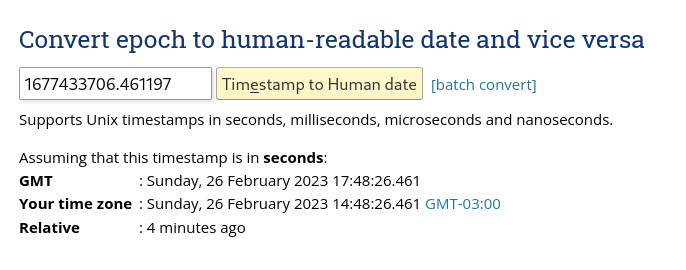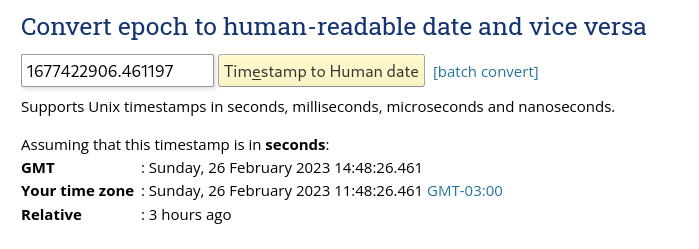The Problem:
A while back I wrote some tests that generated and compared timestamps. At the time I wrote the tests I was in the UK (GMT/UTC+0).
This week I changed the timezone of my machine and re-ran the same tests and (much to my dismay) they failed ...
The tests depended on generating timestamps with:
>>> from datetime import datetime, timezone
>>> now = datetime.now()
>>> now
datetime.datetime(2023, 2, 26, 14, 48, 26, 461197)
>>> now.timestamp()
1677433706.461197
Somewhere in the code these timestamps are converted from a timestamp to a datetime.
>>> from marshmallow import Schema, fields
>>> class MySchema(Schema):
... timestamp = fields.DateTime(format='timestamp')
...
>>> now
datetime.datetime(2023, 2, 26, 14, 48, 26, 461197)
>>> MySchema().load({'timestamp': now.timestamp()})
{'timestamp': datetime.datetime(2023, 2, 26, 17, 48, 26, 461197)}
Strangely, the act of converting the timestamp had caused it to leap ahead by 3 hours.
Debugging
Under the hood, Marshmallow is (correctly) loading the timestamp as UTC.
def from_timestamp(value: typing.Any) -> dt.datetime:
value = float(value)
if value < 0:
raise ValueError("Not a valid POSIX timestamp")
# Load a timestamp with utc as timezone to prevent using system timezone.
# Then set timezone to None, to let the Field handle adding timezone info.
return dt.datetime.fromtimestamp(value, tz=dt.timezone.utc).replace(tzinfo=None)
This all seems pretty sensible so made me realize the bug was probably due to the mechanism I was using to create timestamps in the first place.
It's more clear once you take the timestamp and run it through epochconverter.com:

This timestamp turns out to be system time on my machine (which is 17:48 GMT).
>>> now
datetime.datetime(2023, 2, 26, 14, 48, 26, 461197)
>>> now.timestamp()
1677433706.461197
The following causes the time to leap ahead because it's assuming the original timestamp is already in UTC.
>>> dt.datetime.fromtimestamp(now.timestamp(), tz=dt.timezone.utc).replace(tzinfo=None)
datetime.datetime(2023, 2, 26, 17, 48, 26, 461197)
The Fix:
Instead I needed to write:
>>> now.replace(tzinfo=timezone.utc).timestamp()
1677422906.461197

There's a note about this behaviour in the
documentation
for datetime.datetime.timestamp

With this fix in place, the conversion now works as expected:
>>> now
datetime.datetime(2023, 2, 26, 14, 48, 26, 461197)
>>> schema.load({'timestamp': now.timestamp()})
{'timestamp': datetime.datetime(2023, 2, 26, 17, 48, 26, 461197)}
>>> schema.load({'timestamp': now.replace(tzinfo=timezone.utc).timestamp()})
{'timestamp': datetime.datetime(2023, 2, 26, 14, 48, 26, 461197)}
Lessons Learnt
I guess the key takeaway from this is not to ever write tests that depend on a specific system time, and always try to adhere to UTC, (unless you're specifically forced not to).